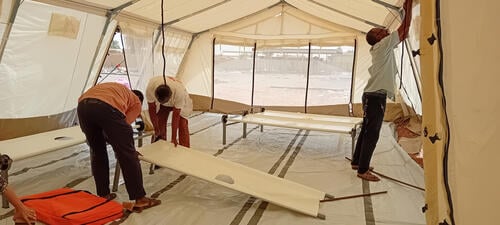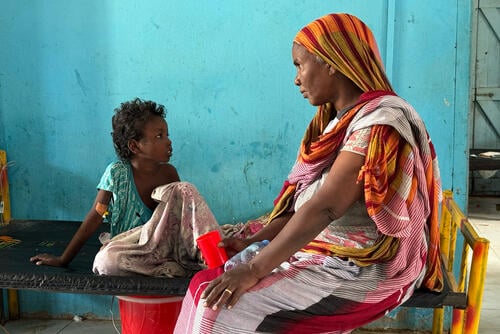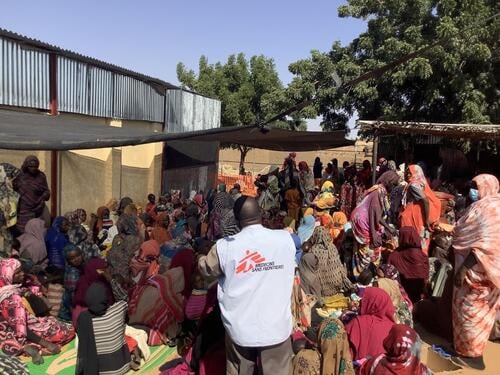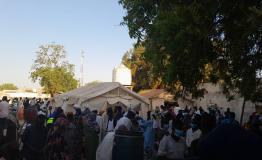A cholera outbreak is gripping central and eastern Sudan, bringing yet more risk, death and misery to people already bruised by the country’s brutal war. Médecins Sans Frontières (MSF) emergency teams are supporting by treating patients and providing water and sanitation services.
War, floods and now, cholera
Sudanese authorities declared a cholera outbreak in August, which is heavily affecting the states of Kassala, Gedaref and River Nile, and is present in Al Jazirah and Khartoum. According to the Ministry of Health, over 5,000 cases of cholera and 190 deaths have been reported. In the second half of August the weekly cases multiplied by four.
Cholera cases are not uncommon in Sudan, but the country has faced outbreaks of the disease since the start of the war in April 2023. For the past year and a half, our teams have actively engaged in emergency responses to mitigate their impact.
“The menacing mix of heavy flooding and torrential downpours with woeful living conditions and inadequate access to drinking water that millions have today, particularly in crowded camps for displaced people, have created the perfect storm for the spread of this often-deadly disease,” says Esperanza Santos, MSF’s emergency coordinator for Sudan.
In Kassala, heavy rains and river floods have destroyed water and sanitation infrastructure and put both internally displaced communities and Eritrean and Ethiopian refugees in even more appalling living conditions.
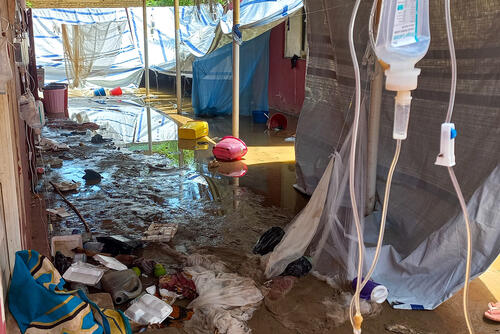
Cholera adds yet another challenge to the crisis in Sudan and more burden to the decimated health system, which is already struggling with increasing child malnutrition, high numbers of war wounded and regular cases of preventable diseases. Regularly obstructed by both warring parties, the humanitarian response remains far below what is needed.
Case management and water and sanitation services
MSF teams in Khartoum, River Nile, Kassala and Gedaref have mobilized to support the Ministry of Health to respond to the situation, by setting up and running cholera treatment centres and units or providing support to existing overwhelmed treatment facilities in some of the most affected areas and in hard-to-reach places where cases are surging.
Between the end of August and 9 September, we treated 2,165 patients in our supported facilities.
Caused by a water-borne intestinal infection, cholera is transmitted through contaminated food or water, or through contact with fecal matter or vomit from infected people. Cholera can cause severe diarrhea and vomiting, and rapidly prove fatal, within hours, if not treated. But cholera is very simple to treat – re-hydration is key.
“One adult man was unconscious [upon arrival to the facility],” recalls Angela Giacomazzi, the human resources coordinator in Tanedba, who happened to be on site when four people arrived in search of treatment. “Dehydration causes the body to go into shock. When the body reaches that point after a few minutes it’s already too late. Doctors were resuscitating him, squeezing litres of fluids in his veins for about five minutes.”
The patient fortunately survived.
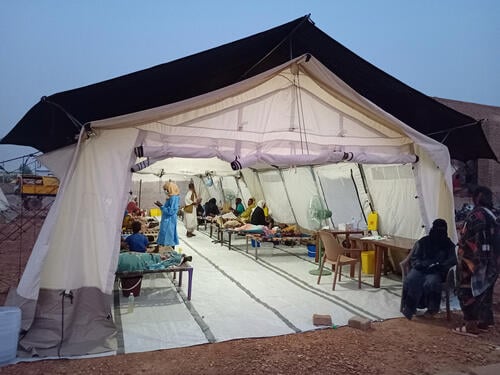
MSF teams are setting up oral rehydration points, delivering drinking water, constructing handwashing points and latrines, distributing hygiene kits and conducting health promotion in the affected communities.
In Darfur, where no cases have yet been registered, MSF teams are helping to improve preparedness.
Unrestricted rapid access for staff and supplies
“People are dying from cholera right now; hence we plead on the UN and international organisations to fund and scale up activities, particularly water and sanitation services,” says Frank Ross Katambula, MSF medical coordinator. “These services are crucial to stop the lethal spread.”
After nearly 17 months of challenges and obstructions around the provision of humanitarian assistance in Sudan, MSF also calls on warring parties to allow unhindered access of medical staff and supplies to all the areas in need across Sudan to enable a quick and coordinated response and prevent avoidable deaths.
“There is a risk of running out of essential supplies, such as cholera kits, in a moment when scaling up the response is urgently needed,” says Katambula. “We call on the authorities to fast-track and facilitate the delivery of supplies and drugs, as bureaucratic obstacles remain a major challenge.”



